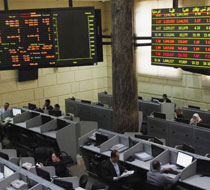
Egypt stocks sink 3.6pc as political crisis deepens
Dubai, July 8, 2013
Egyptian stocks fell sharply on Monday as the country's political crisis deepened, with violence on the streets blocking efforts to form a new government following the ouster of president Mohamed Mursi.
At least 51 people were killed when, according to Islamist demonstrators enraged by the military's overthrow of Mursi, the army opened fire during morning prayers at the Cairo barracks where he is being held. The military said it was repelling an attack by "a terrorist group".
The markets have become partly inured to such violence, and although Mursi's Muslim Brotherhood leadership called for an uprising against the army, many analysts doubt the body as a whole has the will or the public support for such a campaign.
But the latest killings had larger political consequences: the ultra-conservative Islamist Nour party, which initially backed the military intervention, said it was withdrawing from stalled negotiations to form an interim government for the transition to fresh elections.
Without a smoothly operating transition government, Egypt is unlikely to be able to begin addressing economic problems such as a ballooning budget deficit, or to negotiate a long-delayed, $4.8 billion loan with the International Monetary Fund.
The benchmark stock index lost 3.6 percent, extending its losses since it jumped to a one-month high last Thursday immediately after Mursi was overthrown. It has now given up more than a third of its gains since it began rallying in late June.
Investors have not completely abandoned hopes that an effective, technocratic government will be installed. Yields dropped at a government bond auction on Monday while the Egyptian pound strengthened slightly in both the official and the black markets.
Saudi Arabia and the UAE, which have strong political motives to ensure stability in a post-Mursi Egypt, are widely expected to provide large amounts of financial aid as soon as in coming days. Egypt's central bank governor visited Abu Dhabi on Monday.
Nevertheless, little fresh private money looks likely to go into Egyptian assets until there is a lot more clarity on the political outlook. Exchange data on Monday showed foreign investors were net stock sellers, against Egyptian buyers.
"Foreigners are quite rattled by the political change and they won't be buyers until there's more clarity on the economy and politics," said Simon Kitchen, director of regional strategy at EFG-Hermes in Cairo.
DUBAI RALLIES
United Arab Emirates markets rallied as investors bought shares ahead of second-quarter earnings announcements in coming weeks. But trading volumes stayed thin with many investors away for summer holidays.
Dubai's defensive stocks, which tend to pay high dividends, and some others expected to post strong quarterly earnings growth led a rally on the bourse.
"What you've seen today is accumulation in certain securities that people are expecting will announce good Q2 results," said Marwan Shurrab, fund manager and head of trading at Vision Investments. "It's retail buying backed by institutional buying and defensive stock-picking."
Budget carrier Air Arabia and telecom operator du advanced 3.6 percent and 5.3 percent. Contractor Arabtec rose 2.9 percent after the firm said its 2.4 billion dirham ($653 million) rights issue was oversubscribed by nearly 30 percent; the offer period was extended after it initially failed to sell out.
Dubai's index climbed 2.6 percent to finish at 2,341 points, its highest close since June 20.
Mohab Maher, senior manager of the institutional desk at MENA Corp, said the break of the 2,300 mark was a trigger for investors to buy, with the next target at 2,500 points.
In Abu Dhabi, the emirate's index gained 1.8 percent to close at its highest finish since June 19. Aldar Properties rose 4.9 percent, and heavyweight banks also gained.
In Saudi Arabia, the benchmark slipped 0.3 percent, edging off Sunday's 15-month high as some investors opted to book gains in banking shares. The sector's index dipped 0.5 percent.
MONDAY'S HIGHLIGHTS
DUBAI: The index rose 2.6 percent to 2,341 points.
ABU DHABI: The index climbed 1.8 percent to 3,645 points.
SAUDI ARABIA: The index slipped 0.3 percent to 7,695 points.
EGYPT: The index dropped 3.6 percent to 5,123 points.
KUWAIT: The index retreated 0.7 percent to 7,934 points.
OMAN: The index gained 0.3 percent to 6,464 points.
QATAR: The index declined 0.9 percent to 9,283 points.
BAHRAIN: The index slipped 0.2 percent to 1,192 points.







